Abstract
OBJECTIVES: The objectives of this study were to assess the work demands as potential stressors of health service consultants, and to describe the development of tools for measuring stress experiences of consultants. METHODS: A stratified random sample of 500 NHS consultants in Scotland was targeted by a postal questionnaire and 375 (75%) returned a valid response. They completed questionnaires, including information on demographic factors, work demands, occupational stressors, and burnout. RESULTS: Principal components analysis showed that professional work demands of consultants fell into three categories: clinical, academic, and administrative. Their perceived stressors separated into four main factors: clinical responsibility, demands on time, organisational constraints, and personal confidence. These were assessed by 25 questions in the specialist doctors' stress inventory. Specific questions about perceived stressors which resulted in a high positive response included questions about demands on time, and organisational change in the NHS. CONCLUSION: These self reported data characterise and measure the consultants' work demands and their role as potential stressors. These measurements could form the basis for strategies to reduce occupational stress in these workers.
Full text
PDF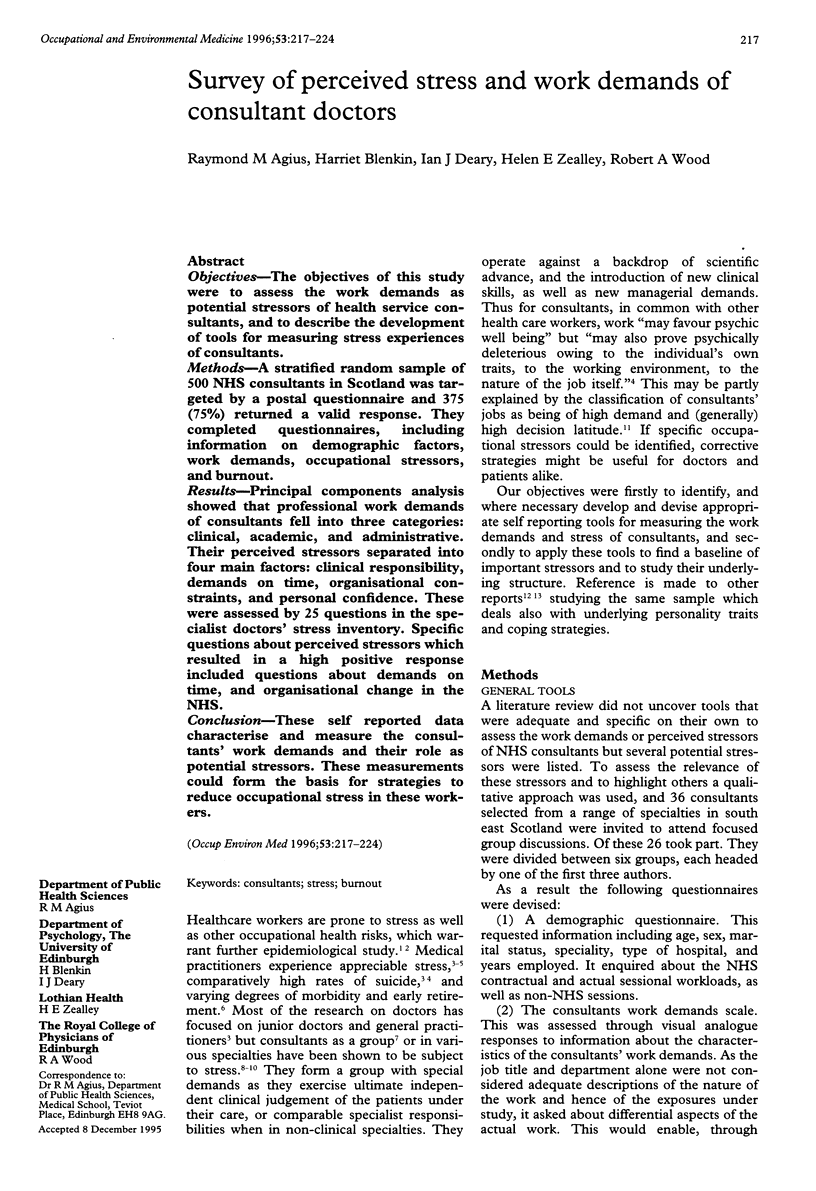
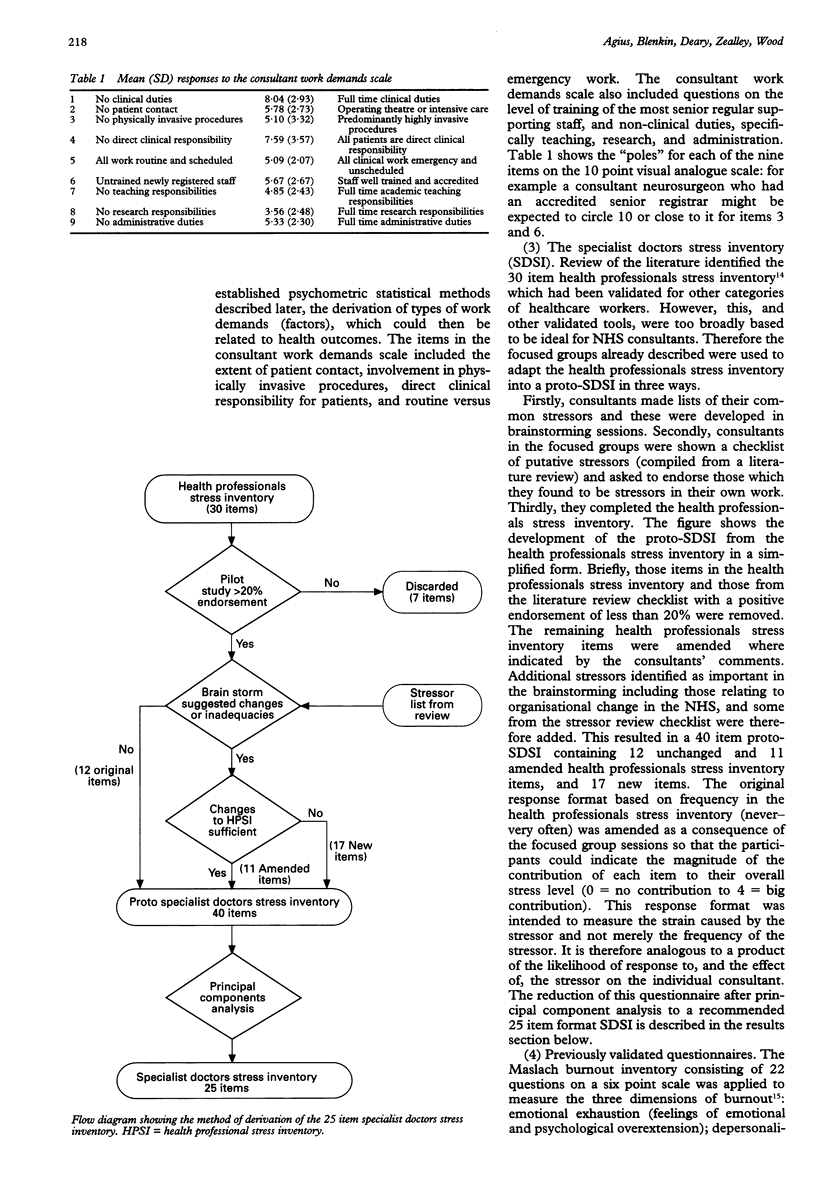
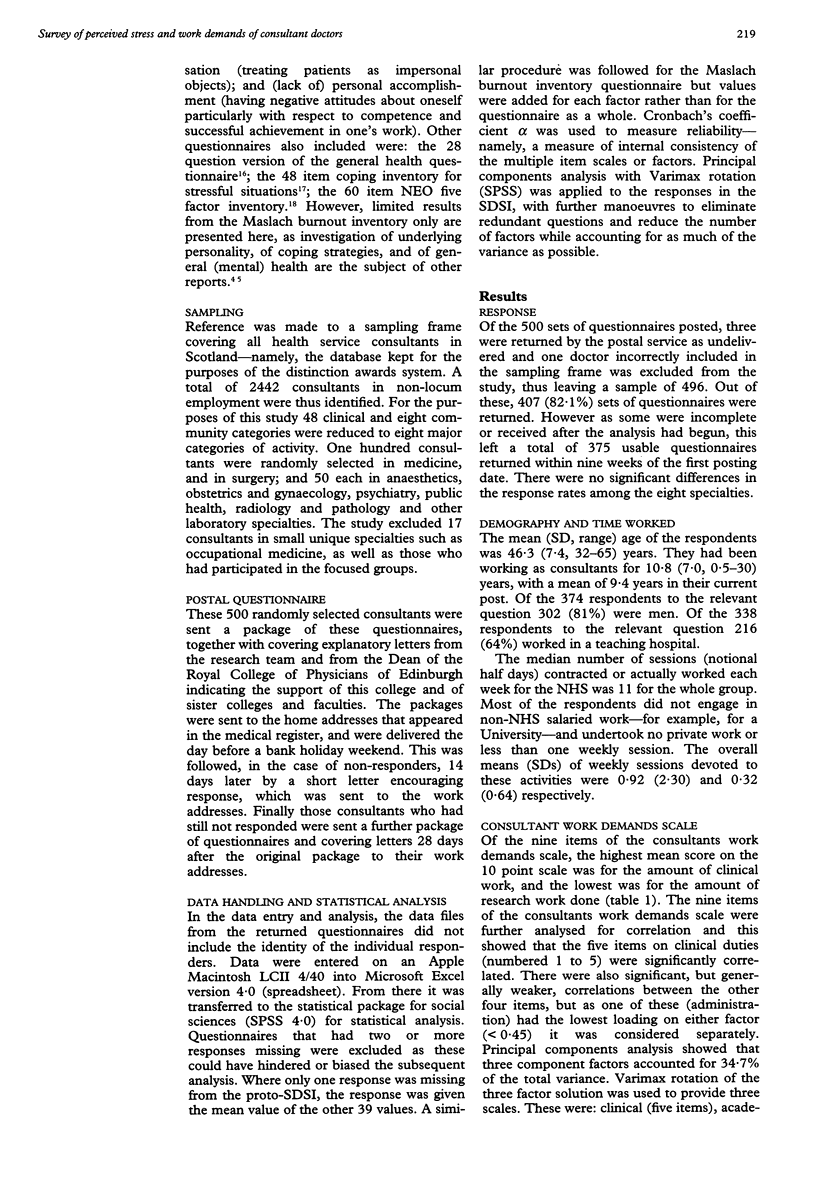
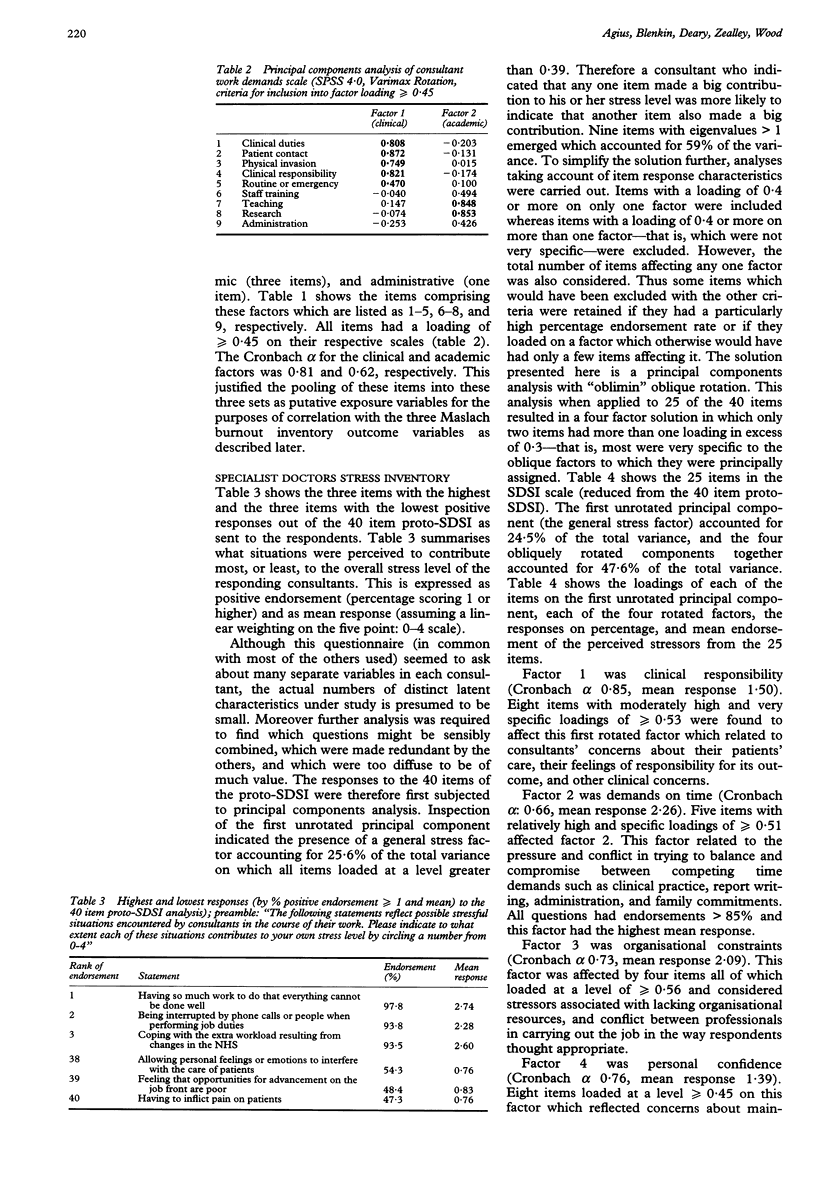
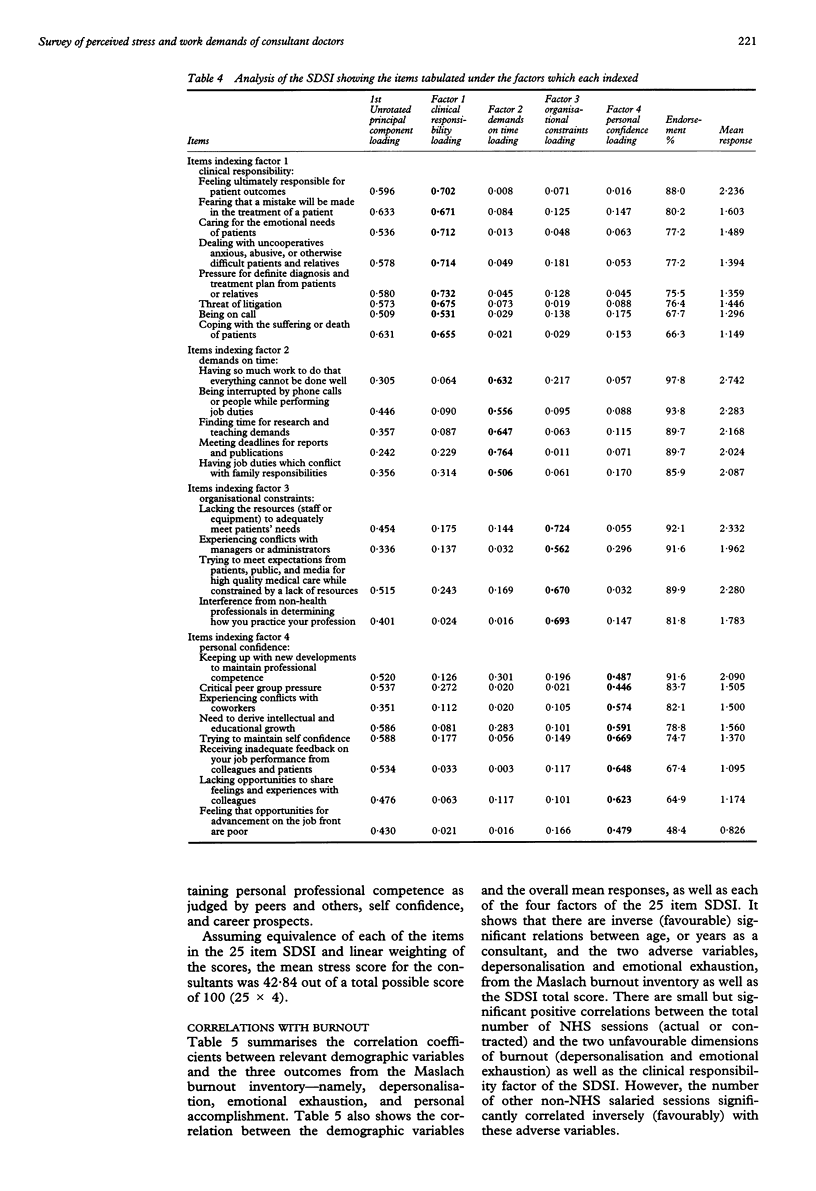
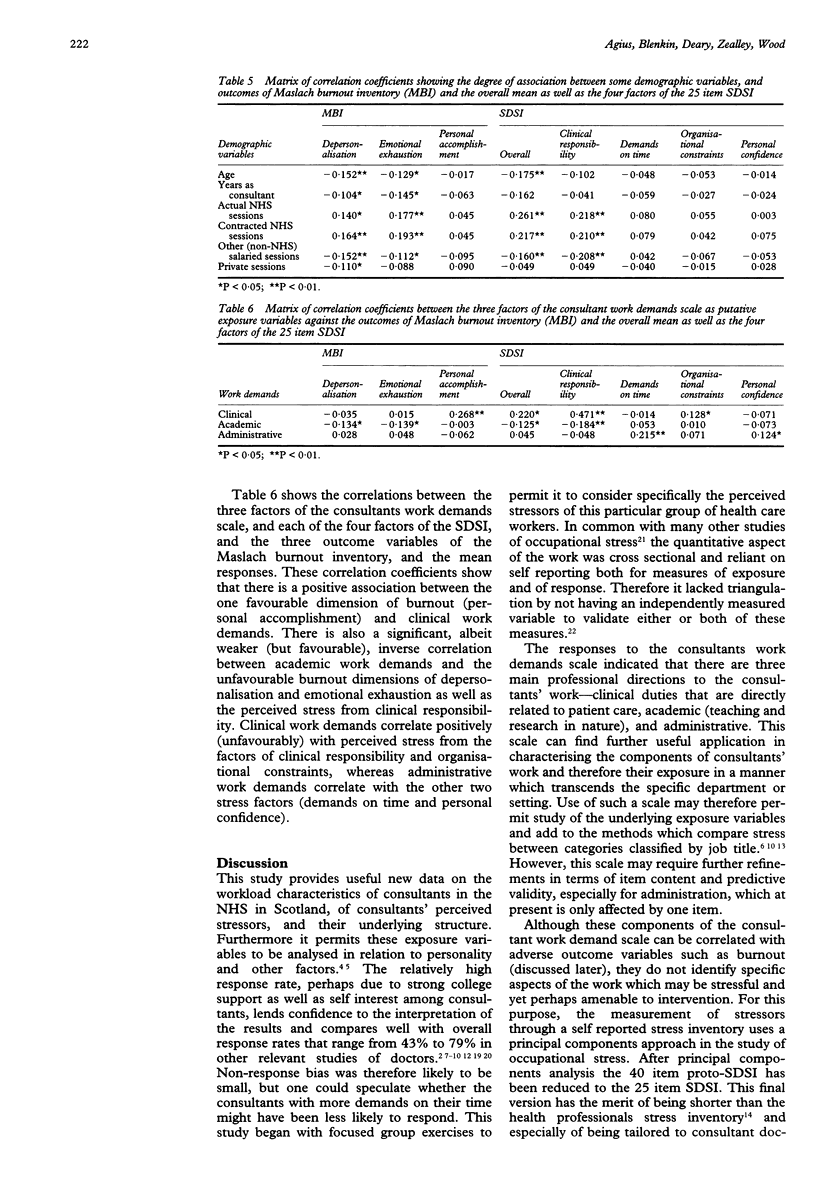
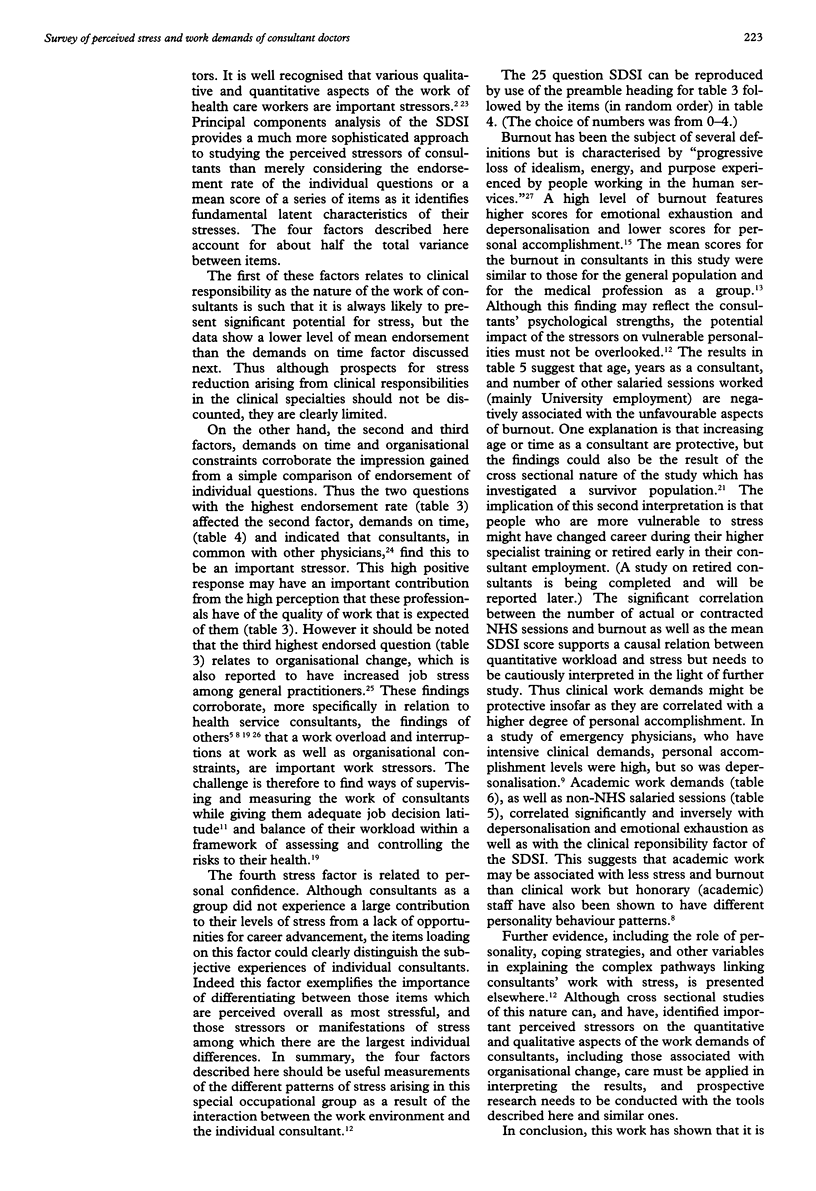
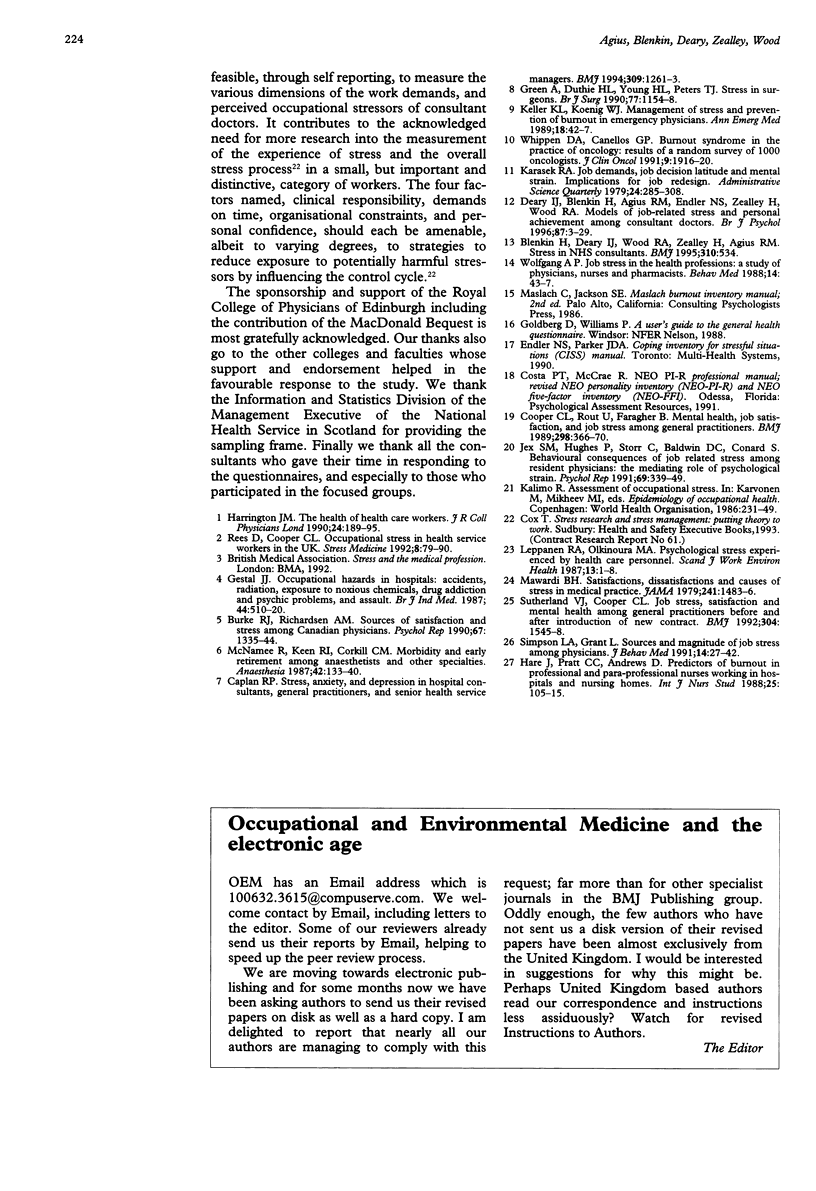
Selected References
These references are in PubMed. This may not be the complete list of references from this article.
- Blenkin H., Deary I., Sadler A., Agius R. Stress in NHS consultants. BMJ. 1995 Feb 25;310(6978):534–534. doi: 10.1136/bmj.310.6978.534. [DOI] [PMC free article] [PubMed] [Google Scholar]
- Burke R. J., Richardsen A. M. Sources of satisfaction and stress among Canadian physicians. Psychol Rep. 1990 Dec;67(3 Pt 2):1335–1344. doi: 10.2466/pr0.1990.67.3f.1335. [DOI] [PubMed] [Google Scholar]
- Caplan R. P. Stress, anxiety, and depression in hospital consultants, general practitioners, and senior health service managers. BMJ. 1994 Nov 12;309(6964):1261–1263. doi: 10.1136/bmj.309.6964.1261. [DOI] [PMC free article] [PubMed] [Google Scholar]
- Cooper C. L., Rout U., Faragher B. Mental health, job satisfaction, and job stress among general practitioners. BMJ. 1989 Feb 11;298(6670):366–370. doi: 10.1136/bmj.298.6670.366. [DOI] [PMC free article] [PubMed] [Google Scholar]
- Deary I. J., Blenkin H., Agius R. M., Endler N. S., Zealley H., Wood R. Models of job-related stress and personal achievement among consultant doctors. Br J Psychol. 1996 Feb;87(Pt 1):3–29. doi: 10.1111/j.2044-8295.1996.tb02574.x. [DOI] [PubMed] [Google Scholar]
- Gestal J. J. Occupational hazards in hospitals: accidents, radiation, exposure to noxious chemicals, drug addiction and psychic problems, and assault. Br J Ind Med. 1987 Aug;44(8):510–520. doi: 10.1136/oem.44.8.510. [DOI] [PMC free article] [PubMed] [Google Scholar]
- Green A., Duthie H. L., Young H. L., Peters T. J. Stress in surgeons. Br J Surg. 1990 Oct;77(10):1154–1158. doi: 10.1002/bjs.1800771024. [DOI] [PubMed] [Google Scholar]
- Hare J., Pratt C. C., Andrews D. Predictors of burnout in professional and paraprofessional nurses working in hospitals and nursing homes. Int J Nurs Stud. 1988;25(2):105–115. doi: 10.1016/0020-7489(88)90078-8. [DOI] [PubMed] [Google Scholar]
- Harrington J. M. The health of health care workers. The Ernestine Henry lecture 1990. J R Coll Physicians Lond. 1990 Jul;24(3):189–195. [PMC free article] [PubMed] [Google Scholar]
- Jex S. M., Hughes P., Storr C., Baldwin D. C., Jr, Conard S., Sheehan D. V. Behavioral consequences of job-related stress among resident physicians: the mediating role of psychological strain. Psychol Rep. 1991 Aug;69(1):339–349. doi: 10.2466/pr0.1991.69.1.339. [DOI] [PubMed] [Google Scholar]
- Keller K. L., Koenig W. J. Management of stress and prevention of burnout in emergency physicians. Ann Emerg Med. 1989 Jan;18(1):42–47. doi: 10.1016/s0196-0644(89)80309-9. [DOI] [PubMed] [Google Scholar]
- Leppänen R. A., Olkinuora M. A. Psychological stress experienced by health care personnel. Scand J Work Environ Health. 1987 Feb;13(1):1–8. doi: 10.5271/sjweh.2086. [DOI] [PubMed] [Google Scholar]
- Mawardi B. H. Satisfactions, dissatisfactions, and causes of stress in medical practice. JAMA. 1979 Apr 6;241(14):1483–1486. [PubMed] [Google Scholar]
- McNamee R., Keen R. I., Corkill C. M. Morbidity and early retirement among anaesthetists and other specialists. Anaesthesia. 1987 Feb;42(2):133–140. doi: 10.1111/j.1365-2044.1987.tb02985.x. [DOI] [PubMed] [Google Scholar]
- Simpson L. A., Grant L. Sources and magnitude of job stress among physicians. J Behav Med. 1991 Feb;14(1):27–42. doi: 10.1007/BF00844766. [DOI] [PubMed] [Google Scholar]
- Sutherland V. J., Cooper C. L. Job stress, satisfaction, and mental health among general practitioners before and after introduction of new contract. BMJ. 1992 Jun 13;304(6841):1545–1548. doi: 10.1136/bmj.304.6841.1545. [DOI] [PMC free article] [PubMed] [Google Scholar]
- Whippen D. A., Canellos G. P. Burnout syndrome in the practice of oncology: results of a random survey of 1,000 oncologists. J Clin Oncol. 1991 Oct;9(10):1916–1920. doi: 10.1200/JCO.1991.9.10.1916. [DOI] [PubMed] [Google Scholar]
- Wolfgang A. P. Job stress in the health professions: a study of physicians, nurses, and pharmacists. Behav Med. 1988 Spring;14(1):43–47. doi: 10.1080/08964289.1988.9935123. [DOI] [PubMed] [Google Scholar]


